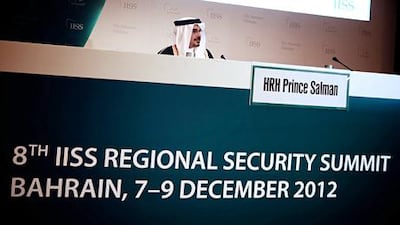MANAMA // Bahrain's crown prince, Salman bin Hamad Al Khalifa, has called for dialogue with the political opposition and institutional reforms to ease the country's anti-government protests.
"Security is not the only guarantor of stability. Without justice there can no freedom, and without freedom there can be no true security," Crown Prince Salman said late Friday at a conference on Middle East security organised by the International Institute for Security Studies.
"Only through the genuine application of a just and fair and inclusive legal system will people feel that their own rights and their own futures are protected," he added.
The crown prince, seen widely as a moderate voice within the Al Khalifa family, balanced his renewed call for negotiations and reform with an appeal to Shiite religious leaders using a term more commonly associated with senior religious figures in Iran, which Bahraini authorities have accused of helping foment the protests, if not orchestrating them - an allegation Tehran denies.
"I call on all those who disagree with the government, including the ayatollahs, to condemn violence on the street unequivocally," the crown prince said. "Responsible leadership is called for and I believe dialogue is the only way forward."
More than 55 people have died since February 2011, when protests by members of the majority Shiite community demanding greater representation in government widened and violence between security forces and demonstrators became escalated. Bahraini authorities declared a state of emergency and received the help of other Gulf governments, including the UAE and Saudi Arabia, to help bring the upheaval under control. The crown prince singled out these countries for thanks in his remarks, a signal that the country will continue its hard line on security here.
In late October, Bahrain's interior ministry banned public gatherings, and just days later, the country revoked the citizenship of 31 opposition activists. Demonstrations and clashes with police continue almost daily in predominantly Shiite villages on the edges of Manama, sending plumes of smoke and the occasional whiff of tear gas drifting across the capital.
Prince Abdulaziz bin Abdullah, the deputy foreign minister of Saudi Arabia, echoed the tougher side of the crown prince's speech, telling the policymakers and regional experts gathered here that the governments of the Gulf Cooperation Council (GCC) "cannot tolerate instability" that could threaten their leadership.
He added, however, that "solutions could come from dialogue and not through any other ways".
Hours before the speech by Crown Prince Salman on Friday, Bahrain's opposition bloc, led by the Shiite political organisation Al Wefaq, urged a resumption of talks with the government.
"Let's come to a political agreement. We are ready for dialogue without preconditions," Wefaq leader Sheikh Ali Salman told a crowd of hundreds of supporters at a rally. He reiterated the opposition's condemnation of violence - written in a non-violence declaration in November - and bluntly told protesters to abandon calls for the downfall of the monarchy.
"We don't welcome this slogan," he told those attending the rally moments after the chant began to swell.
Deep differences between the government and the opposition did not preclude occasional coordination on a lower level.
Al Wefaq's rally on Friday was initially planned as a march, but the opposition agreed to conduct a lower-profile event after speaking with the Bahraini authorities.
"There was an agreement made to make the event a sit-in," said a source, who asked not to be identified. "This is a sign that the opposition remains pragmatic and open to dialogue."
Low-level exchanges could form the foundation of more serious dialogue, said Bahrain's foreign minister, Sheikh Khaled bin Ahmed Al Khalifa, while not referring specifically to last week's rally.
"Talks don't have to be on big issues. It could start talking about issues such as human rights or the needs of the citizens," he said yesterday. "That can also bring everybody together and break the ice."
But international and local human rights activists argue that changes have come too slowly and security forces continue to respond to the demonstrations with disproportionate force.
"If it's not getting better, it's getting worse," said Amal, a 29-year-old activist. "The government still insists on using force."
The Bahraini government's staging of the conference was seen as a modest sign of progress after unrest forced the cancellation of the annual gathering last year. Sensitivity still runs high, however.
In a listing during his speech of critical allies in the Bahraini government's struggle to contain the unrest, Crown Prince Salman made no reference to the United States. Many of the experts and policymakers gathered here interpreted the omission as a slap against Washington for its criticism of the Bahraini government's crackdown.
The head of the US delegation, Deputy Secretary of State William Burns, credited Bahrain's leadership for some reforms aimed at easing the tensions, including giving more powers to the elected parliament. But he noted "there is much to do" in following through with recommendations by an independent fact-finding committee last year that included calls for investigation into allegations of high-level abuses against protesters.
Others saw the exclusion as a criticism of the assertion that the Obama administration is turning away from the Middle East in favour of Asia. That suggestion was ridiculed by John McCain, a US senator and former Republican Party presidential candidate.
"The idea that the US can pivot away from the Middle East is the height of foolishness."
edickinson@thenational.ae
* With additional reporting by The Associated Press

